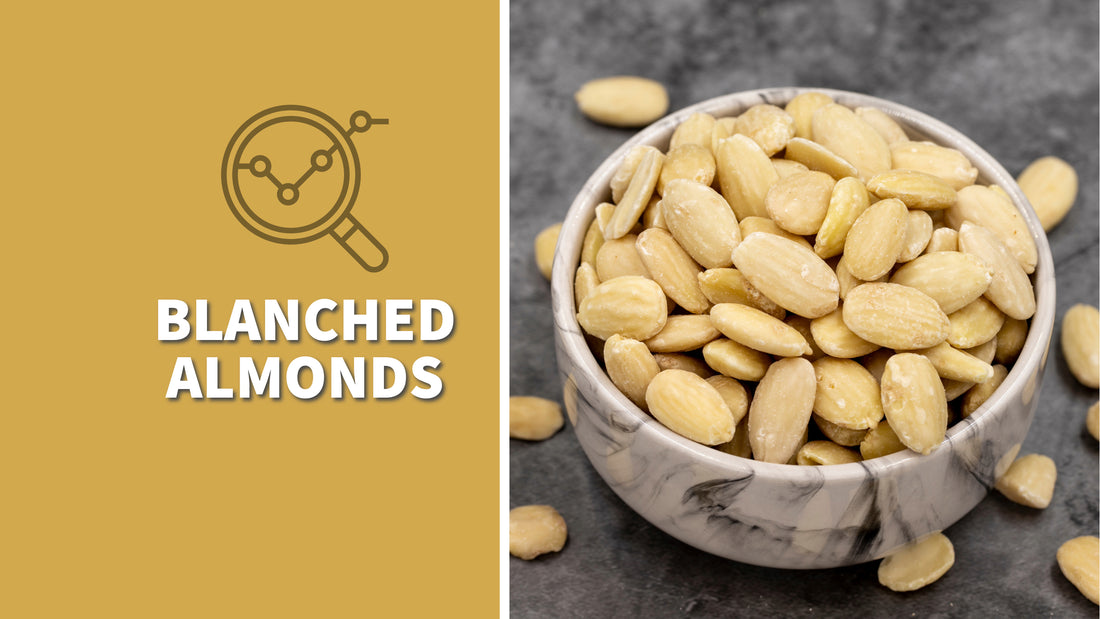
Blanched Almonds Guide
Blanched almonds are almonds that have been briefly boiled to remove their skins. This process results in a smoother, creamier texture and a more subtle flavor compared to raw almonds. Blanched almonds are a versatile ingredient used in various culinary applications, from baking to cooking.
Production Process:
- Harvesting: The process begins with the harvesting of almonds from almond trees. Once harvested, the almonds are dried to reduce moisture content, making them easier to handle and process.
- Blanching: The almonds are then submerged in boiling water for a short period, usually a minute or less. This brief exposure to heat loosens the skin without cooking the almond itself.
- Cooling and Peeling: After blanching, the almonds are quickly cooled in cold water to stop the cooking process. The skins become wrinkled and are easily removed by gently squeezing the almonds.
- Drying: Once the skins are removed, the blanched almonds are dried to remove any excess moisture. This step is crucial to prevent mold growth and to maintain the quality of the almonds.
- Quality Check and Packaging: The final step involves a quality check to ensure only the best almonds are packaged. They are then packed and distributed for various uses.
Applications:
Blanched almonds are widely used in both sweet and savory dishes. Their applications include:
- Baking: Ideal for making almond flour or almond meal, used in pastries, cakes, and cookies.
- Cooking: Used in sauces, such as the classic Spanish romesco sauce, or as a creamy base for soups and curries.
- Garnishing: Sliced or slivered blanched almonds add a decorative touch and texture to dishes.
- Confectionery: Essential in making marzipan, almond paste, and other sweet treats.
- Snacking: Eaten as a snack, either alone or mixed with other nuts and dried fruits.
Nutrition:
Blanched almonds retain most of the nutritional value of raw almonds. They are:
- Rich in Protein: A good source of plant-based protein, essential for muscle repair and growth.
- High in Healthy Fats: Predominantly monounsaturated fats, which are beneficial for heart health.
- Fiber Content: Contains dietary fiber, important for digestive health.
- Vitamins and Minerals: A source of vitamin E, electrolytes (magnesium and potassium), and calcium, among other nutrients.
- Low in Carbohydrates: Makes them suitable for low-carb diets.
Home Use:
Blanched almonds are a popular ingredient in home kitchens due to their versatility and ease of use. They can be used in a variety of recipes, including:
- Baking: Blanched almonds are often ground into almond flour for gluten-free baking. They're used in cakes, cookies, and bread.
- Cooking: They can be sliced or slivered for use in salads, stir-fries, and as toppings for various dishes.
- Homemade Almond Milk: Blanched almonds are ideal for making smooth, creamy almond milk at home.
Athletic Use:
For athletes, blanched almonds are a nutritious snack option. They provide a good balance of protein, healthy fats, and carbohydrates, making them an excellent energy source. Athletes often use blanched almonds or almond products like our Energy Pods and CocoZen for pre-workout energy boosts or post-workout recovery snacks.
Health Benefits
Blanched almonds, with their skins removed, offer a range of health benefits, making them a valuable addition to a balanced diet. Here's an extensive, science-backed look at the health advantages of incorporating blanched almonds into your diet:
Heart Health: Almonds are known for their heart-healthy properties. Studies have shown that regular consumption of almonds can improve lipid profiles by reducing levels of LDL (bad) cholesterol and maintaining or increasing HDL (good) cholesterol. This effect is attributed to their high content of monounsaturated fats, antioxidants like vitamin E, and fiber.
Weight Management: Almonds can play a role in weight management strategies. Despite being calorie-dense, their high protein and fiber content promotes satiety, which can help reduce overall calorie intake. Additionally, not all calories in almonds are absorbed, as some of the fat remains trapped within the fiber matrix of the nut.
Blood Sugar Control: Almonds have a low glycemic index and can help in managing blood sugar levels. Their combination of healthy fats, fiber, and protein makes them an ideal snack for people with diabetes, helping to prevent spikes in blood sugar.
Digestive Health: The fiber in almonds supports digestive health by promoting regular bowel movements and feeding beneficial gut bacteria. This can be particularly beneficial in preventing constipation and promoting a healthy gut microbiome.
Nutrient-Rich: Almonds are a rich source of essential nutrients, including vitamin E, magnesium, calcium, and potassium. These nutrients play vital roles in various bodily functions, from antioxidant defense to bone health.
Antioxidant Properties: Vitamin E, a powerful antioxidant found in almonds, helps combat oxidative stress and inflammation in the body, which are linked to various chronic diseases.
Skin Health: The vitamin E in almonds also benefits skin health, contributing to its nourishment and protection against damage from UV radiation and environmental pollutants.
Muscle and Nerve Function: Magnesium in almonds is crucial for muscle and nerve function. It plays a role in muscle relaxation and contraction and helps in the transmission of nerve impulses.
Bone Health: Almonds provide calcium, essential for maintaining bone health and preventing osteoporosis. They also contain phosphorus, which is vital for bone structure and strength.
Cancer Prevention: Some studies suggest that the consumption of almonds may be associated with a reduced risk of certain types of cancer, such as breast cancer. This is attributed to their antioxidant and anti-inflammatory properties.
Energy Production: Almonds are a good source of riboflavin (vitamin B2) and manganese, which are involved in energy production within the body.
Brain Health: Almonds contain nutrients like riboflavin and L-carnitine, which are beneficial for neurological activity and preventing cognitive decline.
In summary, blanched almonds offer a plethora of health benefits, making them a nutritious addition to any diet. Their versatility in culinary applications further enhances their appeal as a healthful food choice. However, as with any food, they should be consumed in moderation as part of a varied and balanced diet.
Blanched Almonds We Use
Blanched almonds serve as a primary ingredient in our food products. We use locally sourced blanched California almonds which support local growers and bee populations while making our products exceptionally nutritious and tasty. Blanched almonds, from a culinary standpoint, capture flavors exceptionally well while serving as a nutrient powerhouse for athletes.
FAQ:
Why are almonds blanched?
Almonds are blanched to remove the skin, which can be slightly bitter. This process results in a smoother texture and a more neutral flavor, making them more versatile for cooking and baking. Blanched almond flour is used in several gluten-free and healthy baking recipes and food products.
Are there health benefits to blanching?
Blanching does not significantly alter the nutritional content of almonds. However, it makes them more digestible and can enhance their flavor and texture in recipes.
Does blanching reduce allergens?
Blanching does not reduce the allergenic proteins in almonds. Those with almond allergies should avoid both raw and blanched almonds.
Why are blanched almonds added to food products?
Blanched almonds are added to food products for their smooth texture, mild flavor, and nutritional value. They are commonly used in baking, cooking, and confectionery products.
How are blanched almonds digested in our bodies?
Blanched almonds are digested similarly to other nuts. Their fiber content aids in digestion, while the proteins and fats are broken down and absorbed for energy and other bodily functions.
What is the taste of blanched almonds versus regular almonds?
Blanched almonds have a milder, creamier taste compared to regular almonds, which have a slightly more robust and nuttier flavor due to the skin.
Can I bake or cook with blanched almonds?
Yes, blanched almonds are excellent for baking and cooking. They can be ground into flour, sliced, slivered, or used whole in various recipes.
How do you store blanched almonds?
Store blanched almonds in a cool, dry place, preferably in an airtight container. They can also be refrigerated or frozen to extend their shelf life.
Are blanched almonds natural or organic?
Blanched almonds can be both natural and organic, depending on the farming practices used to grow the almonds. Organic blanched almonds are available, sourced from almonds grown without synthetic pesticides or fertilizers.
Are blanched almonds shelf-stable?
Yes, blanched almonds are shelf-stable, but they should be stored properly to prevent rancidity due to their high fat content. Cool, dry storage conditions are ideal.
